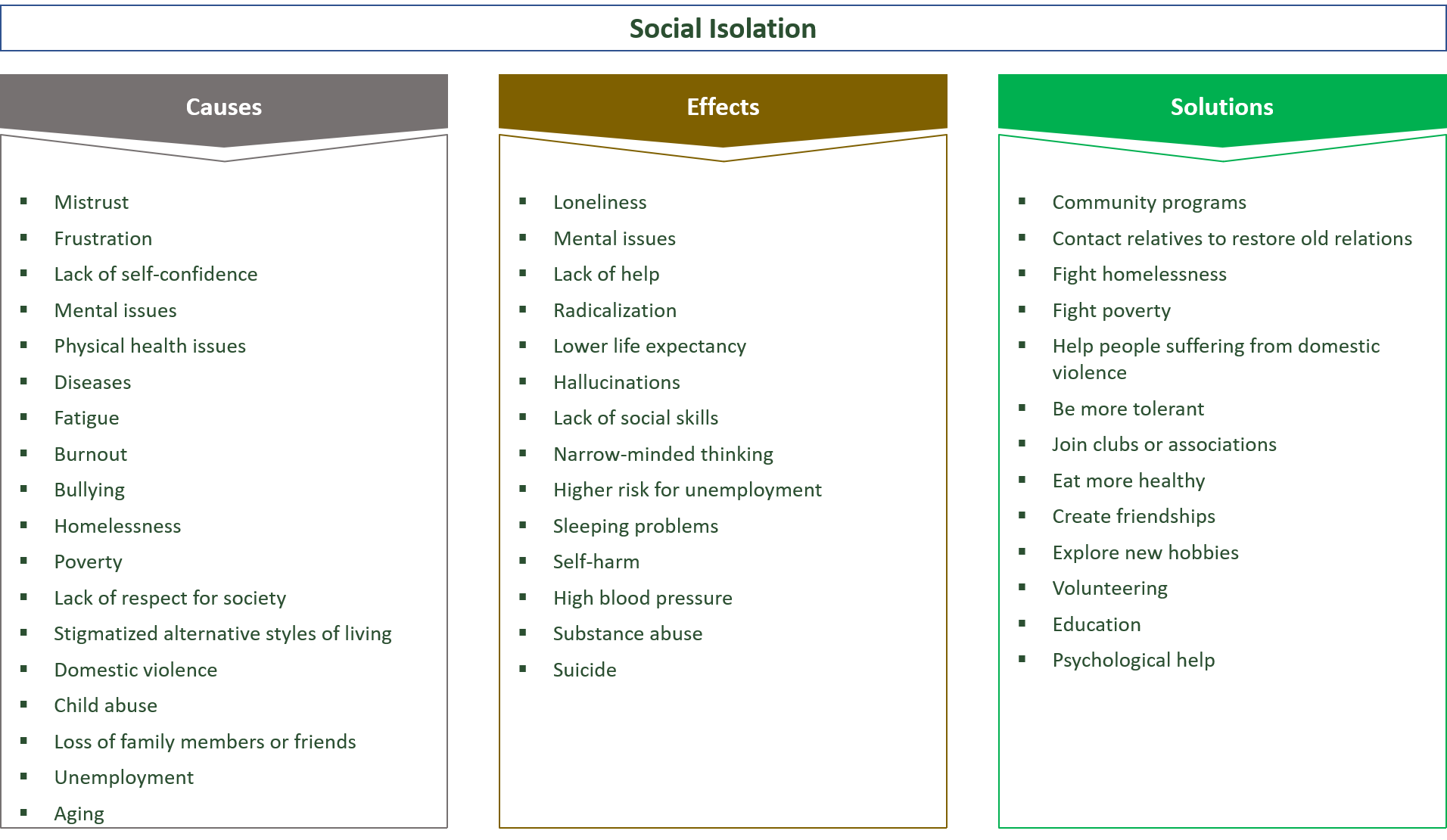“Too much self-centered attitude, you see, brings, you see, isolation. Result: loneliness, fear, anger. The extreme self-centered attitude is the source of suffering.”
Dalai Lama, Leader
Social Isolation: Causes, Effects & Solutions

Social isolation (sometimes also referred to as social exclusion) can be defined as a state of a lack of contact between an individual and society.
Certain age groups are more affected than others due to several reasons.
For instance, old people may have already lost most of their friends since they simply died while young people haven’t experienced this issue yet.
Social isolation can have many adverse effects on individuals as well as for society as a whole.
In this article, the causes, effects and solutions regarding social isolation are examined.
Audio Lesson
Contents
Causes for Social Isolation
- Mistrust
- Frustration
- Lack of self-confidence
- Mental issues
- Physical health issues
- Diseases
- Fatigue
- Burnout
- Bullying
- Homelessness
- Poverty
- Lack of respect for society
- Stigmatized alternative styles of living
- Loss of family members or friends
- Unemployment
- Aging
Mistrust
Mistrust against other people or politicians due to bad experiences in the past can lead to social isolation.
People may no longer be willing to fit into the social system since they do not trust anyone anymore.
For instance, some people may be quite angry with politicians since they do not feel supported enough or may have suffered from financial issues due to political decisions in the past.
Moreover, some people may have got robbed by family members or friends and will therefore mistrust everyone around them now.
Frustration
Another cause of social isolation may be frustration.
If people are frustrated and do not feel like they are a valuable member of the community, they might isolate themselves since they feel to be better off without social contacts.
People may also lack the power of building new relationships due to frustration since they do not see a realistic perspective to do so.
Lack of self-confidence
Some people may also feel worthless and do not value themselves enough.
This may translate into low levels of self-confidence which may in turn lead to social isolation.
These people may think that no one wants to be their friends since they think they have certain characteristics or visual appearances that are repulsive to other people.
Mental issues
Mental issues can be a significant cause of social isolation.
People who are suffering from mental health conditions may not be able to participate in our society since they may develop schizophrenia or other diseases that prevent them from being active members of society.
Depending on the severity of mental issues, people may also need support from psychologists in order to mitigate these issues which in turn may scare other people to deal with them due to social stigmas.
Physical health issues
Physical health conditions may also prevent people to actively participate in our society.
If people suffer from chronic pain or other health issues that make it hard for them to walk or to carry out common daily life tasks, it will also be hard to meet new people and connect to others since these people may often not be able to leave their home.
Diseases
There are several diseases that can lead to social isolation.
For instance, if people suffer from HIV, other people, especially when it comes to finding a partner, will likely reject you since they are afraid to be infected with the disease as well.
Moreover, some people are still not aware that HIV cannot be transmitted through daily life actions and may therefore refrain to be friends with an HIV-positive person, even if there is no actual threat at all for them.
Fatigue
Some people may also just be tired of life and just want to stay alone in their homes.
They may feel that the world they are currently living in has not much to offer for them and therefore refrain from being an active member of society.
Fatigue may also be due to certain diseases, which, if they stay untreated, may lead to further mental as well as to physical health issues in the future.
Burnout
Burnout can be another cause of social isolation. In our nowadays society, people are often flooded with so much information that their brain is simply not able to process this information anymore.
This information overload can lead to excessive levels of stress, which may eventually translate into burnout.
If people are burned out, they may not be willing to participate in society anymore since they suffer from mental issues related to burnout and often just want to unplug and stay on their own.
Bullying
If people became victims of bullying when they were a kid, these people may also suffer from social isolation in later stages in their life since they fear to be bullied in the future.
They may also mistrust other people due to their bad past experiences and may rather stay alone than engage in social activities.
Homelessness
If you are homeless, chances are that you become socially isolated since many people in our society do not want to deal with you anymore.
Moreover, you might feel worthless or develop inner hate towards society, which also prevents you from engaging in social events.
Additionally, when you suffer from homelessness, you might have no money and your priorities may lie on different things rather than to make friends.
Poverty
Poverty may also lead to social exclusion.
For instance, if children from poor families are not able to participate in school excursions due to poverty, they may be bullied in school and lose some of their friends due to that.
Moreover, poverty can also lead to social exclusion in adult life. If you do not have money to engage in sports clubs or certain events, chances may be lower that you meet new people who may become your friends in the future.
Lack of respect for society
Some people just do not respect our society at all since they do not have the same values.
For instance, people who hate war and demonstrate for peace may not be willing to live in a culture which promotes war on a daily basis.
Hence, these people will not respect our society and may refrain from building social connections because of that.
Stigmatized alternative styles of living
Although our society claims to be tolerant and open for everything, the reality is that small groups of people that have alternative styles of living are still stigmatized and often excluded from our society.
Thus, these people may live in their own small communities and may not have too many social contacts outside of it.
These people may also be afraid of attacks from people outside their community who do not value their lifestyle at all and may therefore refrain from building additional connections.
Loss of family members or friends
If you lose persons that are closest to you, you might not be able to emotionally deal with this loss and may therefore develop depressions or other mental issues that may prevent you from building social connections.
You may also lose your existing connections since you may not be able to deal with your mental state and thus may isolate yourself.
Unemployment
Since work is a big part of the life of many people, many social connections and interactions are made at work.
Thus, if you are unemployed, chances are that you suffer from a lack of social connections since you are not able to connect with your colleagues at work.
Aging
When you get older, chances for social isolation increase substantially since some of your friends may have already died.
Moreover, if you get older, your chances for mental or physical health issues increase, which may translate in social isolation since you may not be able to join your sports club or other events anymore due to your adverse health state.

Effects of Social Isolation
- Loneliness
- Mental issues
- Lack of help
- Radical movements
- Lower life expectancy
- Hallucinations
- Lack of social skills
- Narrow-minded thinking
- Higher risk for unemployment
- Sleeping problems
- Self-harm
- High blood pressure
- Drug use
Loneliness
Social isolation may translate into high levels of loneliness.
Since people are wired to be social creatures, an absence of social interactions may lead to the feeling of loneliness and desperation.
Depending on the degree of social isolation, this loneliness may also translate into further mental issues.
Mental issues
Social isolation may lead to mental problems for many people.
These people may feel that no one cares about them and feel worthless due to this.
Moreover, studies have shown that a lack of social connections increases the risk for dementia and other mental health issues since their brain chemistry is likely to be altered due to our kind of social life.
Lack of help
Especially when you get older, you may be dependent on outside help since you may no longer be able to carry out tasks of your daily life due to physical or mental health issues.
However, if you are socially isolated, you will often have not enough friends or family members who are willing to support you.
Radical movements
People who are socially isolated are often quite easy to manipulate since they just have a quite narrow view of life.
These people are at greater risk for radicalization since they may feel to get a purpose in life by joining a radical group.
Thus, social isolation may also be a contributor to fundamentalism.
Lower life expectancy
Several studies have shown that an intact social life and life expectancy are positively correlated.
This is quite logical since people with an intact social life tend to value their life more and may also have more joy in their life.
Thus, their will to live may be stronger when these people become old compared to people who have no one around them.
Hallucinations
In extreme cases of social isolation, people may also suffer from hallucinations due to their loneliness.
This may lead to severe mental issues and may also translate into physical attacks on other people.
Studies have shown that people who are completely isolated are much more likely to suffer from hallucinations compared to people with an intact social circle.
Lack of social skills
Some people are also born with quite a low level of social skills, meaning that these people do not have a high level of empathy for others and will therefore be not able to maintain relationships since these people often unconsciously hurt other peoples’ feelings.
Thus, a lack of social skills may also lead to a significant level of social isolation.
Narrow-minded thinking
Although our society claims to be open for everything and to be quite tolerant towards minorities, reality is that we live in a world that only allows for mainstream thinking and which punishes all other forms of thinking that are not in line with the mainstream cultural values.
Thus, people with alternative approaches towards life may become socially isolated since they may not be respected in our nowadays society.
Higher risk for unemployment
Social isolation also increases the risk of unemployment.
Many jobs are offered through connections that you build during your working career or also in your social circle.
Therefore, people with no or just a few social connections may have it harder to find a new job when they become unemployed compared to people who have plenty of connections to a variety of companies.
Sleeping problems
Social isolation may also lead to sleeping problems.
If people suffer from mental health issues due to social isolation, these people may also suffer from sleeping issues since they may worry too much which may translate into insufficient or also into low-quality sleep.
Self-harm
People with a lack of social connections are also at greater risk to physically harm themselves.
This may be due to mental issues and also to the fact that these people often do not value themselves and thus may be willing to hurt themselves to cover their emotional pain.
High blood pressure
Apart from mental issues, social isolation can also lead to a variety of physical health problems.
One of them is the development of high blood pressure due to unhealthy lifestyles and unhealthy food.
High blood pressure may eventually lead to severe hearth conditions and in the worst case may even lead to death for the affected persons.
Drug use
People who are socially isolated may also be more willing to use illegal drugs or other harmful substances in order to treat their mental pain.
Thus, these people are at greater risk for drug use and to suffer from the issues related to that.

Solutions for Social Isolation
- Community programs
- Contact relatives to restore old relations
- Fight homelessness
- Fight poverty
- Be more tolerant
- Join clubs or associations
- Eat healthier
- Create friendships
- Explore new hobbies
- Volunteering
- Education
- Psychological help
Community programs
In order to mitigate the issue of social isolation and its related adverse effects, community programs could help to do so.
If we give socially isolated people the opportunity to take part in activities they actually like, they are also more likely to connect to other people with similar interests and therefore these people may be able to break out of social isolation.
Contact relatives to restore old relations
We might lose the connection to some family members or friends over the course of our life due to geological distances or also due to diverging opinions regarding our value systems and attitudes towards life.
Thus, you can improve your social connections by calling these people up and try to reconnect with them.
Fight homelessness
Since it is quite hard for homeless persons to develop and sustain social relationships, it is crucial that we help homeless persons to escape homelessness and to reintegrate them into our society.
By doing so, they may be able to build relationships and to escape social isolation.
Fight poverty
Since poverty is a big cause for social isolation, it is crucial that governments and municipalities set up programs with the goal to fight poverty.
This could come in the form of financial subsidies for education or also through mentorship programs.
By doing so, poor people may be more likely to be able to increase their wealth and may therefore be also more likely to be able to join social activities.
Be more tolerant
Tolerance is key when it comes to fighting social isolation.
Only if people feel valued, even if they have different attitudes towards life, they may feel like as a valid member of society.
If people have to fear to be mentally or even physically attacked due to their alternative beliefs, these people will refrain from making social connections.
Thus, it is crucial to be tolerant towards other lifestyles.
Eat healthier
It has been shown by many studies that food consumption behavior is directly linked to physical, but also to mental well-being.
Hence, people who often eat junk food are more likely to develop mental health issues like depression.
These mental health issues may in turn translate into social isolation.
Consequently, in order to fight social exclusion, it is crucial that you eat healthier.
Create friendships
It may also help to just go out and try to make new friends whenever possible.
For instance, if you go shopping, you might ask some salesperson for help to find the perfect style for you.
If you like the person, you might engage in a longer conversation and eventually you may ask this person to meet up for some drinks or other activities.
By doing so, you may find your new soulmate or your future wife or husband on one of these occasions.
Explore new hobbies
Most of the people want to stay in their comfort zone instead of trying new stuff.
The problem with staying in your comfort zone is that it will be hard to develop and find new hobbies.
Hence, if you suffer from social isolation, you should try new sports or other activities.
Chances are that you find things that you actually like and that you will also be able to make new friends due to that.
Volunteering
If you have passion for a certain topic, volunteering is a great way to make a positive impact on the one hand but also to make new friends on the other hand.
Since if you volunteer for a certain purpose, many people will share your view on life, it is almost sure that you will be able to make new social connections.
Education
Our educational system also has to change in a way that it is more focused on tolerance towards minorities and alternative ways of life.
We have to show people at a young age how important tolerance really is.
By doing so, children will become more tolerant towards others and will therefore be more likely to accept other lifestyles.
People living these alternative lifestyles will in turn be more likely to engage in social interactions since they may no longer have to fear rejection.
Psychological help
For people suffering from severe conditions that make it impossible for them to socially interact with other people, psychological help may be suitable to treat these mental issues in order to fight social isolation.
Conclusion
Social isolation is a significant global problem.
There are several causes of social isolation, including mental and also physical health issues.
Social isolation often implies a lower quality of life for the affected people.
It may also translate into physical harm for others if these people become victims of radicalization.
Thus, it is crucial to effectively fight social exclusion in order to improve the quality of life for all of us.
Sources
https://en.wikipedia.org/wiki/Social_isolation
https://www.oecd.org/sdd/37964677.pdf

About the author
My name is Andreas and my mission is to educate people of all ages about our environmental problems and how everyone can make a contribution to mitigate these issues.
As I went to university and got my Master’s degree in Economics, I did plenty of research in the field of Development Economics.
After finishing university, I traveled around the world. From this time on, I wanted to make a contribution to ensure a livable future for the next generations in every part of our beautiful planet.
Wanna make a contribution to save our environment? Share it!